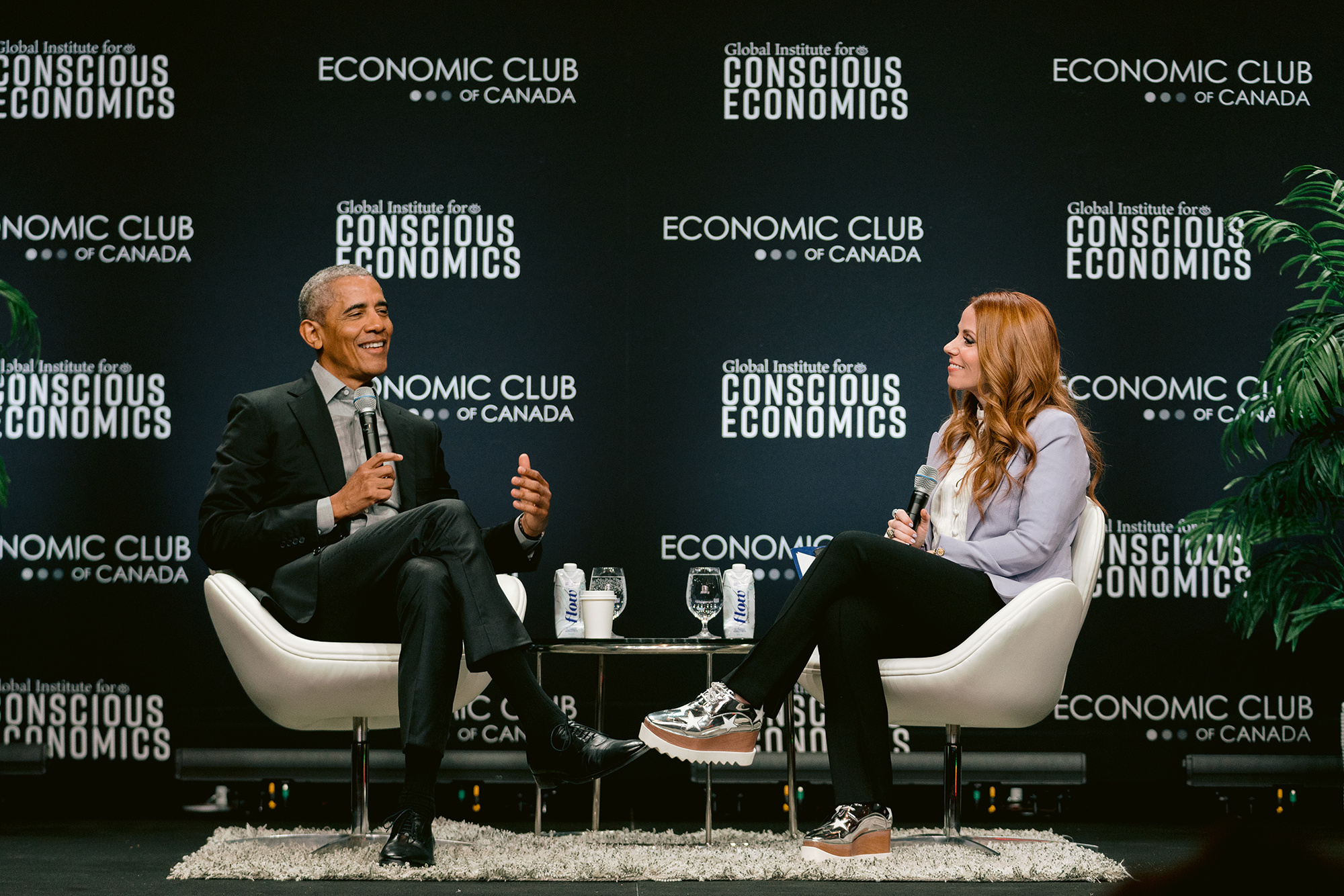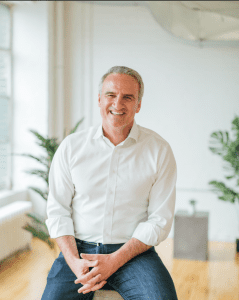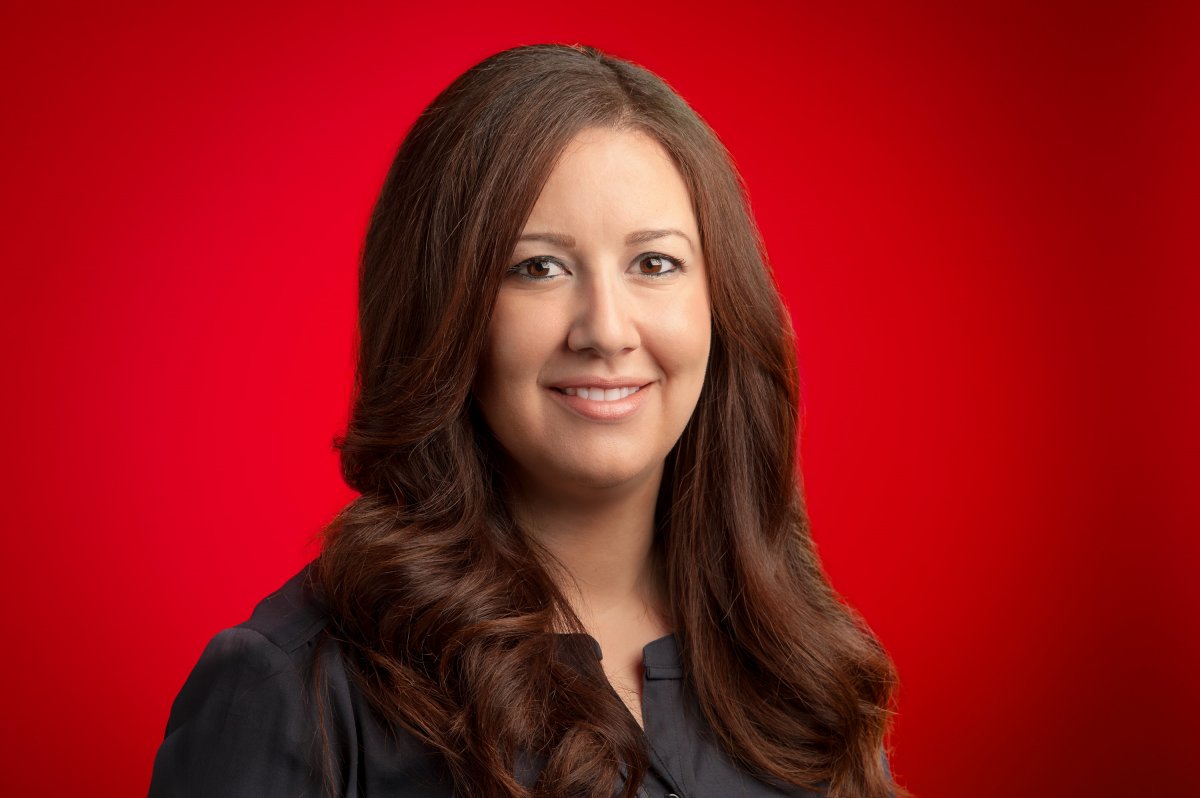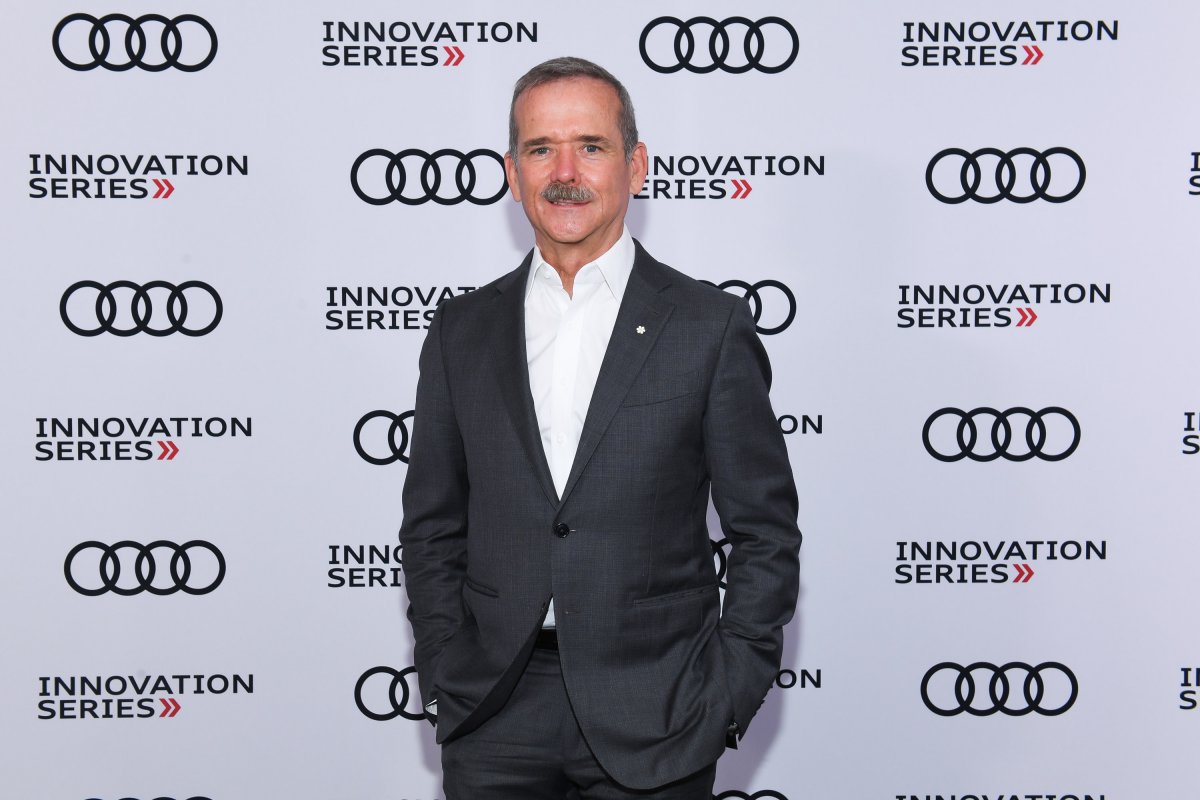[vc_row][vc_column][vc_column_text]On January 23, 6000 people in Toronto skipped school or work to breathe the same air as the incomparable – and arguably effortlessly charming – President Barack Obama.
Hosted by the Economic Club of Canada (ECC) and the Global Institute for Conscious Economics, and moderated by the ECC owner and CEO, Rhiannon Rosalind, “Future Skills: A conversation with President Barack Obama” was the first of a series that explores the future of work and the new economy. It filled the Metro Toronto Convention Centre with both powerful thinkers and global business leaders of today and the future leaders of tomorrow. With a goal of empowering youth, the audience ratio was 1:1 — for every business leader, executive, educator, or political figure, one young person attended free of charge.
“This ratio is an acknowledgment that, currently, those who inherit the world from us don’t have a say in how we treat it. This is one of the greatest challenges that we face as a society and it’s something we hope to change by encouraging true multi-generational dialogue,” said Rosalind.
“Our goal is for Canadians to recognize that our socio-political and economic systems need to be modernized. For centuries, there has been no significant, systematic, structural innovation, or evolution, in our systems. In the age of disruptive innovation and creative destruction, this is no longer acceptable or appropriate for the needs of modern times. A system that doesn’t consider the voices of the youth is obsolete and, therefore, must be changed.”
From climate change and a dated education system, to Obama’s equally beloved wife Michelle (and a few subtle Trump jabs), all topics were on the table.
Here are five takeaways from Obama about business and the workforce.[/vc_column_text][vc_single_image image=”16098″ img_size=”full” onclick=”custom_link”][vc_custom_heading text=”1. A Top-Down Approach Is Unsustainable.” font_container=”tag:h2|font_size:22|text_align:left”][vc_column_text]Obama credits his relatively peaceful and progressive eight years in office to a collaborative leadership style, putting emphasis on the fact that you can’t stand “on rank and hierarchy” but rather, as a leader you need to think of ways to ensure that every person feels as though they’re heard, seen, and contributing.
“They can talk to me in a way that’s not shaking and trembling and ‘yes sir, no sir,’ but rather ‘hey, I think this is what we should do; this is what we’re trying to achieve,’ and they’re going to get a real hearing,” said Obama. “That culture sustained itself throughout the eight years, which is part of the reason why we were able to not only get a lot done, but do it the right way and avoid some of the scandal and nastiness that attends a lot of politics.” [/vc_column_text][vc_custom_heading text=”2. Strong and Diverse Teams Are Better Problem Solvers. ” font_container=”tag:h2|font_size:22|text_align:left”][vc_column_text]“One thing that I’ll say that applies to government, business, the nonprofit sector, you name it — basketball teams, because I saw Masai [Ujiri] earlier and I think the Raptors were good examples of this — is building an effective team,” said Obama.
According to Obama, it was important for him to find people who fit the same values he believes in when building his team. “They had to have a core integrity. We had a ‘no jerk rule’ that we couldn’t always apply because sometimes there were some jerks you needed and you said ‘come on over here.’ Then you kind of built some guardrails so they don’t infect the entire enterprise.” An effective team, he explained, reflects a diversity of backgrounds, skill sets, mindsets, and ages to account for his “blind spots;” things he knows nothing about.
“As President of the United States, I was very proud of the fact that I did not have a problem admitting, ‘I have no clue what you’re talking about; please explain this to me,’” said Obama. “If I’ve got a table of folks who are exactly like me, then we will all have the same blind spot and we’ll all make the same mistakes. What I was consistently looking for is people who are excellent at what they do and have expertise, but have some variety of skill sets, angles of attack, so that when I convene a meeting in the Cabinet Room or the Situation Room and am going around the table, I have confidence that I have the best brains working from the best angles on this problem. Then, the process that I am setting up is that we are going to get the most accurate information — the facts, the data — around the problem.” [/vc_column_text][vc_custom_heading text=”3. Imagination, Creativity, and Human Interaction Are Key in Modern Economies.” font_container=”tag:h2|font_size:22|text_align:left”][/vc_column][/vc_row][vc_row][vc_column width=”1/2″][vc_single_image image=”16101″ img_size=”full” onclick=”link_image”][/vc_column][vc_column width=”1/2″][vc_column_text]“Anything that is replicable, rote, repeatable, some machine is going to do better. And that’s not just blue-collar work, that’s not just robots in an assembly line. Increasingly, it’s also a whole lot of work that traditionally was done by people in offices,” said Obama of the changing workforce. He cites an example of the White House; entire rooms once dedicated to a secretarial pool “as recently as 20 years ago” have long since disappeared.[/vc_column_text][/vc_column][/vc_row][vc_row][vc_column][vc_column_text]As tasks become increasingly automated, Obama suggests focusing on the things humans do uniquely, outlining that first you must set goals and ask ourselves “What is it that we are trying to do? That involves imagination and empathy and values,” he explains. The second thing is: “What are the things that we are doing creatively because they haven’t been done before and therefore can’t just be put into an algorithm?’ Creative thinking becomes important,” said Obama.
“Those skills that had to do with interacting with other humans – whether as a teacher, or a healthcare provider, or somebody who can help guide and build teams – those things become very, very important. Now, what’s also important is being able to use these tools of automation effectively; sort of a marriage of human capacity with the power, the leverage, that automation provides.”[/vc_column_text][vc_custom_heading text=”4. A Changing Economy is Anxiety-Inducing. ” font_container=”tag:h2|font_size:22|text_align:left”][vc_column_text]Obama addressed the “ongoing anxiety and crisis” brought on by people struggling to find meaning in many advanced economies. He points to globalization and technology as sources of anxiety for many people in today’s fast-changing economies. “Even if you haven’t lost your job because the factory closed because China is now making what used to be made in your town, you may still be looking over your shoulder thinking ‘my factory may be next.’ That will make you stressed. That’s one; if a robot or machine has replaced the job you used to do, you may feel economically vulnerable. That is a stress that is expressing itself in a lot of different places.”
Obama points to studies that show that, in societies where people feel as though they are on an upward trajectory, “even if the starting point is low,” tend to be more optimistic than societies that feel like they are on a downward trajectory, even if they feel their starting point is high. He cited Vietnam – which he recently visited with Michelle – as an example of the former. [/vc_column_text][vc_media_grid style=”pagination” element_width=”6″ grid_id=”vc_gid:1580322237365-b3bc1abb-1fc8-3″ include=”16099,16100″][vc_custom_heading text=”5. It’s Time to Reconnect. ” font_container=”tag:h2|font_size:22|text_align:left”][vc_column_text]Obama highlights the loss of traditional coping mechanisms that people used to deal with such anxieties in the past — when they rooted themselves in things like religion, community associations, and neighbourhood organizations — with the onslaught of fragile and temporary methods in today’s society.
“What that’s been replaced by are flimsy, fragile relationships on our phones and a lack of real community. A lack of purpose, meaning, connection…people are feeling isolated,” said Obama. “The number of followers you have is not the same as having some friends who you can count on and spend time with.” A way to deal with anxiety, said Obama, is to examine the overall economics that are making people insecure, but also to “remake new versions of those institutions, organizations, and affiliations that gave us a sense of connections with others, and give us a sense of something outside of ourselves.” This, he says, is what gives people the courage to move things forward.
[/vc_column_text][/vc_column][/vc_row]













